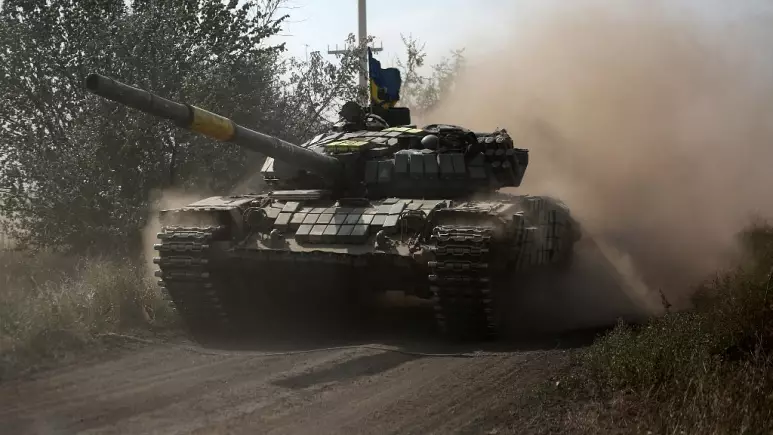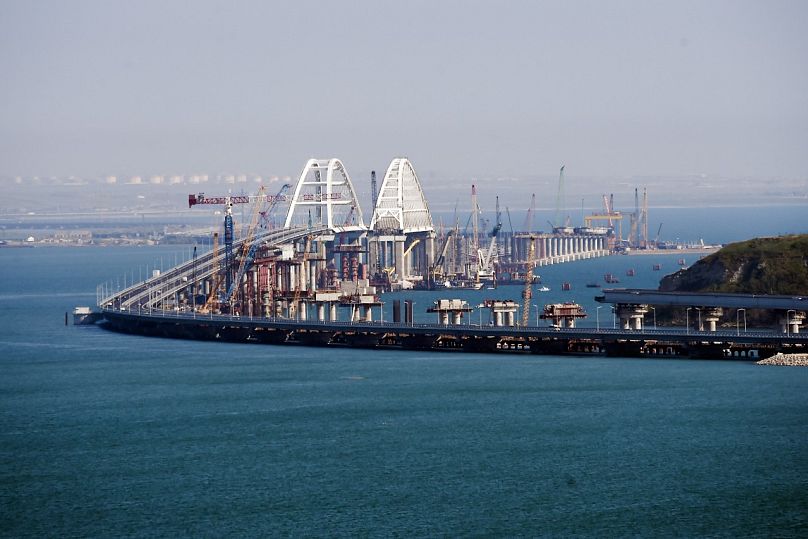Crimea attacks ‘likely part of Ukrainian counteroffensive’
Explosions at key Russian positions in occupied Crimea on Tuesday were „likely part of a coherent Ukrainian counteroffensive to regain control of the west bank of the Dnipro River,” according to the US think-tank the Institute for the Study of War (ISW).
Meanwhile, British defence intelligence said that „Russian commanders will highly likely be increasingly concerned with the apparent deterioration in security across Crimea, which functions as a rear base area for the occupation”.
Detonations at an ammunition depot near Dzhankoi were continuing on Wednesday following the previous day’s explosions and fires that Russia acknowledged were „an act of sabotage”.
It was a vivid reminder of Russia’s vulnerability in Crimea and led to chaotic scenes when around 3,000 people had to be evacuated.
„A nearby railway and electricity sub-station were also likely damaged,” said the UK defence ministry’s daily update, adding that „smoke was rising from near Gvardeyskoye Airbase” in central Crimea, according to Russian media.
Gvardeyskoye and Dzhankoi „are home to two of the most important Russian military airfields in Crimea”, British intelligence said.
„Russian supply lines from Crimea directly support Russian forces in mainland Ukraine including those in western Kherson Oblast,” said the ISW’s bulletin.
Although Kyiv has not claimed responsibility, the targeting of Russian positions in Crimea would be „consistent with the Ukrainian counteroffensive effort” and would likely disrupt the Russians’ ability to sustain their forces and defend them from counterattacks.
If Ukrainian forces were behind the explosions, it would suggest that their operatives are able to penetrate deeply into Russian-occupied territory.
Tuesday’s blasts follow those at another Crimean air base last week. Russia seized the Crimean Peninsula in 2014 and has used it to launch attacks against Ukraine since its invasion on February 24.
The top official in Crimea said on Wednesday that the FSB security service had broken up a terrorist cell of a banned Islamist group.
A statement did not say whether six people who were detained were linked with the recent explosions. But Dzhankoi was mentioned as one of two locations where it claimed the alleged cell had been „neutralised”.
2. Ukraine threatens to dismantle Putin’s flagship bridge linking Russia to Crimea
Ukraine threatened on Wednesday to dismantle the Kerch Bridge, built at great expense by Moscow to connect Russia to the annexed Crimean peninsula.
„This bridge is an illegal object, permission for the construction of which was not given by Ukraine. It harms the peninsula’s ecology and therefore must be dismantled. Not important how – voluntary or not,” tweeted Ukrainian presidential adviser Mykhaylo Podolyak.
The bridge, which was inaugurated by Russian President Vladimir Putin in May 2018, stretches for 19 kilometres.
It took two years to build and cost $3.6 billion (€3.5 billion) and is Putin’s project to show that Crimea has joined Russia for good, opening up the peninsula four years after its annexation by Moscow.
Podolyak’s comments come after the recent series of explosions in Crimea at Russian positions.
3. No let-up in Russian shelling in east and south
On Ukraine’s eastern front, the stalemate between both sides continued, with the brutality of the shelling causing ever more death and destruction.
In the Donetsk region at the forefront of the Russian offensive, two civilians were killed and seven others were wounded by Russian shelling of several towns and villages in the last 24 hours, Governor Pavlo Kyrylenko said on Telegram.
Russian Tu-22M3 long-range bombers fired cruise missiles at the Odesa region overnight, leaving four people injured, according to Odesa regional administration spokesman Oleh Bratchuk.
In the southern city of Mykolaiv, two Russian missiles damaged a university building early Wednesday but injured no one.
The Russian forces also shelled Kharkiv and various parts of the Kharkiv region overnight, damaging residential buildings and civilian infrastructure but inflicting no casualties.
4. Ukrainian nuclear workers ‘under barrels of Russian guns’, says technician
Ukrainian technicians at the Russian-held Zaporizhzhia nuclear power plant work under the barrels of Russian guns but are staying on to make sure there is no Chernobyl-style disaster, Reuters reports.
A technician at the site, who asked that his identity not be disclosed for fear of Russian reprisals, offered a rare glimpse into the fraught working conditions at the plant, which Moscow and Kyiv accuse each other of shelling.
The technician told Reuters that many workers had sent their families away from the town of Enerhodar in southern Ukraine where the plant is located.
Heavily-armed Russian troops are everywhere at the site, which is in itself highly unnerving, and armoured personnel carriers have their barrels pointed at the entrance as workers enter, the technician added.
„They’re constantly walking around the premises with guns. It’s very hard when you go into the plant and see these people and have to be there. It’s very mentally and psychologically taxing.”
The Russian Defence Ministry did not immediately reply to a request for a comment.
Energoatom, the top Ukrainian state body that normally oversees the plant, said it believed the facility’s workers were being pressured and were also in danger.
One of the constant fears is the electricity lines to the plant could be severed because the pumps that cool the reactor core and spent fuel pools need electricity to function, the technician said.
Even though only two of the six reactors are functioning currently, there is still a huge amount of important safety work for staff to do.
„The staff came back to maintain control because the security of Ukraine is at stake and that of the whole European continent and the world,” the technician said.
Europe’s biggest nuclear plant was captured by Russia in March and the bouts of shelling have prompted calls for an urgent mission of the UN nuclear watchdog to the facility. On Wednesday NATO Secretary General Jens Stoltenberg demanded an urgent „inspection” of the plant by the IAEA.
5. Russia warns Britain against planned spy plane overflight
Russia’s Defence Ministry warned Britain Tuesday against a planned spy plane flight over Russian territory, saying the country’s air force has been given orders to prevent an intrusion.
The tough statement comes amid tensions between Russia and the West over Moscow’s action in Ukraine.
The ministry said that Britain has sent a notice informing about a planned flight of an RC-135 reconnaissance plane along a route that partly passes over Russian territory.
“We regard this action as a deliberate provocation,” the ministry said, adding that the Russian air force has been “given the task to prevent the violation of the Russian border.”
“All possible consequences of this deliberate provocation will lie entirely with the British side,” the ministry said in a statement, without specifying when and where the British flight was planned.
On Monday, the ministry said a Russian fighter jet was scrambled to intercept a British RC-135 reconnaissance plane that crossed the Russian border near the Svyatoi Nos cape between the Barents and the White Seas. The MiG-31 fighter forced the intruder out, the ministry said.


